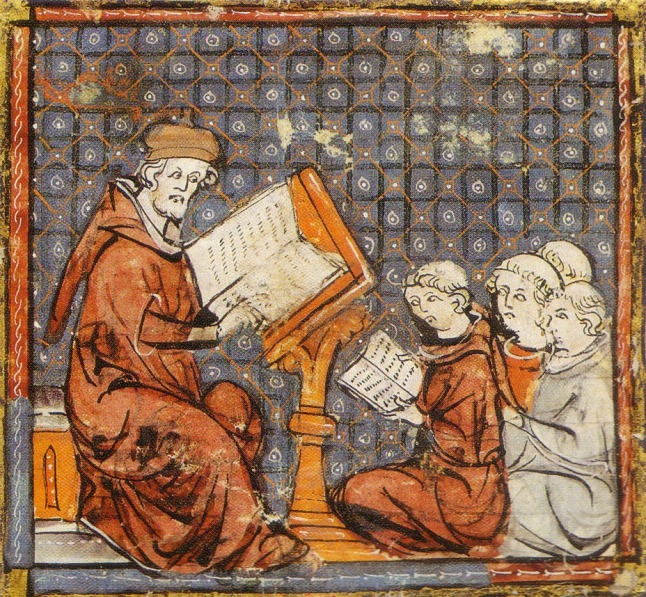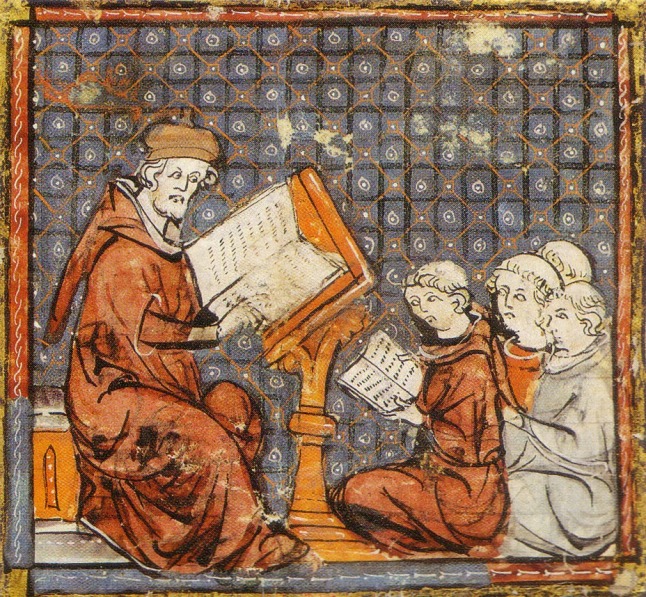
image edited by Web Investigator – The teaching of Logic or Dialetics from a collection of scientific, philosophical and poetic writings, French, 13th century; Bibliotheque Sainte-Genevieve, Paris, France.
Is logical thinking a way to discover or to debate? The answers from philosophy and mathematics define human knowledge
The history of logic should be of interest to anyone with aspirations to thinking that is correct, or at least reasonable. This story illustrates different approaches to intellectual enquiry and human cognition more generally. Reflecting on the history of logic forces us to reflect on what it means to be a reasonable cognitive agent, to think properly. Is it to engage in discussions with others? Is it to think for ourselves? Is it to perform calculations?
In the Critique of Pure Reason (1781), Immanuel Kant stated that no progress in logic had been made since Aristotle. He therefore concludes that the logic of his time had reached the point of completion. There was no more work to be done. Two hundred years later, after the astonishing developments in the 19th and 20th centuries, with the mathematisation of logic at the hands of thinkers such as George Boole, Gottlob Frege, Bertrand Russell, Alfred Tarski and Kurt Gödel, it’s clear that Kant was dead wrong. But he was also wrong in thinking that there had been no progress since Aristotle up to his time. According to A History of Formal Logic (1961) by the distinguished J M Bocheński, the golden periods for logic were the ancient Greek period, the medieval scholastic period, and the mathematical period of the 19th and 20th centuries. (Throughout this piece, the focus is on the logical traditions that emerged against the background of ancient Greek logic. So Indian and Chinese logic are not included, but medieval Arabic logic is.)
Why did Kant disregard the scholastic tradition? And, more generally, what explains the ‘decline’ of logic after the scholastic period? Though in the modern era logic remained an important part of the educational curriculum, there were no fundamental innovations to speak of (with the important exception of some developments in the 17th century, by Gottfried Wilhelm Leibniz). In fact, much of the scholastic achievement got lost, and the logic taught in this period (the one Kant was referring to) was for the most part rudimentary. To be sure, the decline of scholastic logic didn’t happen at once, and in some regions (eg, Spain) innovative work in the scholastic tradition continued to emerge well into the 16th century. However, generally speaking, scholastic logic became less and less prominent after the end of the Middle Ages, except for educational purposes at universities (but again, in watered-down versions).
There were many causes of the decline of scholastic logic. Perhaps the most famous was the damning criticism by Renaissance authors such as Lorenzo Valla. These thinkers deplored the lack of applicability of scholastic logic. Valla, for example, saw syllogisms – arguments composed of two premises and one conclusion, all of which are of the form ‘Some/All/No A is (not) B’, whose premises necessitate the truth of the conclusion – as an artificial type of reasoning, useless for orators on account of being too far removed from natural ways of speaking and arguing. They harshly criticised the ugly, cumbersome, artificial and overly technical Latin of scholastic authors, and defended a return to the classical Latin of Cicero and Vergil. For the most part, these critics did not belong to the university system, where scholasticism was still the norm in the 15th century. Instead, they tended to be civil servants, and were thus involved in politics, administration and civic life in general. They were much more interested in rhetoric and persuasion than in logic and demonstration.
Another reason logic gradually lost its prominence in the modern period was the abandonment of predominantly dialectical modes of intellectual enquiry. A passage by René Descartes – yes, the fellow who built a whole philosophical system while sitting on his own by the fireplace in a dressing gown – represents this shift in a particularly poignant way. Speaking of how the education of a young pupil should proceed, in Principles of Philosophy (1644) he writes:
After that, he should study logic. I do not mean the logic of the Schools, for this is strictly speaking nothing but a dialectic which teaches ways of expounding to others what one already knows or even of holding forth without judgment about things one does not know. Such logic corrupts good sense rather than increasing it. I mean instead the kind of logic which teaches us to direct our reason with a view to discovering the truths of which we are ignorant.
Descartes hits the nail on the head when he claims that the logic of the Schools (scholastic logic) is not really a logic of discovery. Its chief purpose is justification and exposition, which makes sense particularly against the background of dialectical practices, where interlocutors explain and debate what they themselves already know. Indeed, for much of the history of logic, both in ancient Greece and in the Latin medieval tradition, ‘dialectic’ and ‘logic’ were taken to be synonymous.
Up to Descartes’s time, the chief application of logical theories was to teach students to perform well in debates and disputations, and to theorise on the logical properties of what follows from what, insofar as this is an essential component of such argumentative practices. It’s true that not everyone conceived of logic in this way: Thomas Aquinas, for example, held that logic is about ‘second intentions’, roughly what we call second-order concepts, or concepts of concepts. But as late as in the 16th century, the Spanish theologian Domingo de Soto could write with confidence that ‘dialectic is the art or science of disputing’…
more…
https://aeon.co/essays/the-rise-and-fall-and-rise-of-logic



